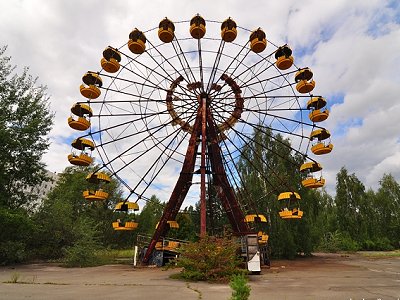
THE ROAD NOT TRAVELLED
We all possess a portfolio of relationships, employment and interests which looked like they might capture our future but did not. Some reflection on the role of God in this helps us at the next moment of loss.
Quietly, in the human imagination, curiosity has been stoked over the abandoned places of the world. Images can be found online of deserted diamond mines in Siberia, train stations in Spain, vanity hotels in North Korea, factories and farmhouses in New York State, chateaux in Belgium and fairgrounds in New Orleans and Japan. Most sobering of all is Pripyat in Ukraine, the nuclear workers’ town which nestles by Chernobyl, deserted by humanity and slowly returning to a state before we subdued the earth.
Why has such fascination been aroused?
These places, solitary and rusting, are hauntingly beautiful, touching a part of our hearts which cannot easily be named but which may be spiritual. In the lost glory of man, there are echoes of the departed glory of God. The Book of Lamentations, pondering the sacking of Jerusalem, begins with the words: How lonely sits the city that once was full of people. For Israel, the deporting of the nation to Babylon marked the end of God’s blessing on the people, begun at the Exodus and concluding with exile. Their interpretation of this event was forged in lament and the sense of abandonment. Where was God amid these ruins?
The biblical journey is one from garden to city: from Eden to the heavenly Jerusalem; from Genesis to Revelation. This impetus is interrupted when our aspirations outstrip our resources and vanity overruns our capability. Mary predicted the mighty would be cast down from their thrones and many of these abandoned places witness to the pride that precedes a fall. We are reminded of our mortality and of our transient role upon this planet; we must accept that in the end, it is God who will make all things new.
These photographs of deserted places ask questions of our own spiritual journey. Where are the abandoned places in our lives; the hopes and dreams which were half built but left to rust when circumstances overtook us? There are roads which it seemed God would take us down but which remained tantalisingly beyond reach and which now look overgrown with weeds, testimony to the passage of time. We all possess a portfolio of relationships, roles, employment, interests and places which looked like they might capture our future but did not. Our culture does not tolerate those who wistfully reflect on what might have been, encouraging us instead never to look back, in the spirit of Edith Piaf’s Je ne regrette rien.
While the spiritual journey of the Christian is drawn magnetically by the hope which lies ahead of us, the calculated neglect of the avenues we did not or could not take should be resisted. The Israelites forged some enduringly powerful theology out of the experience of exile, of their deportment to the strange land of Babylon from the familiar landscape of home. We may never know why we were not able to travel some roads in life or why some journeys are abruptly terminated, but some reflection on those turning points, how they felt and how God manifested himself at the fork in the road is time well spent. In it we find resilience to interpret the defining moments which still lie ahead of us, where one of those roads looks pristine but will eventually be covered in weeds.
POPULAR ARTICLES

Obama's Covert Wars
The use of drones is going to change warfare out of all recognition in the next decades.

Through A Glass Starkly
Images of traumatic incidents caught on mobile phone can be put to remarkable effect.

What Are British Values?
Is there a British identity and if so, what has shaped the values and institutions that form it?


